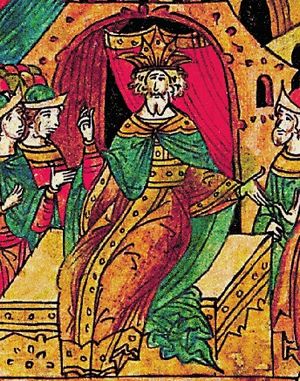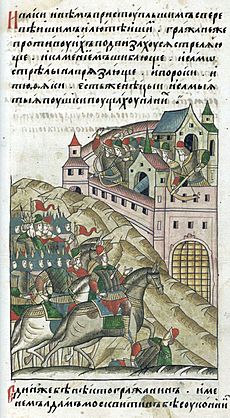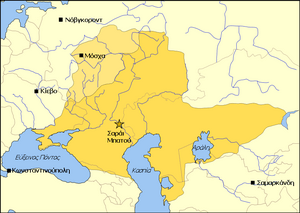Tokhtamysh facts for kids
Quick facts for kids Tokhtamysh |
|
|---|---|
| Khan | |

A portrait from the Czar Book.
|
|
| Khan of the Golden Horde Eastern Half (White Horde) |
|
| Coronation | 1378 |
| Reign | 1376–1380 |
| Predecessor | Temur-Malik |
| Successor | himself of the Khan of the Golden Horde |
| Khan of the Golden Horde | |
| Reign | 1380–1397 |
| Predecessor | himself of the Khan of the Golden Horde |
| Successor | Temür Qutlugh |
| Khan of the Tatar Siberian Khanate | |
| Reign | 1397–1406 |
| Predecessor | unknown |
| Successor | Chekre Khan |
| Born | c. 1342 White Horde |
| Died | 1406 Tyumen |
| Dynasty | Borjigin |
| Father | Tuli Kwadja |
| Religion | Islam |
Tokhtamysh (Tatar: Тухтамыш/Tuqtamış, Persian: توقتمش), born around 1342, was an important Khan who ruled parts of the Golden Horde. He managed to bring together the two main parts of the Golden Horde, the White Horde and the Blue Horde, into one strong state. Many people remember him as the last great leader of the Golden Horde lands. He died in 1406.
Contents
Tokhtamysh's Early Life and Rise to Power
Tokhtamysh was a descendant of Genghis Khan, a famous Mongol leader. He first appeared in history around 1376. At that time, he tried to take over the White Horde from his uncle, Urus Khan. When this didn't work, he escaped and found help from the powerful leader Timur.
Tokhtamysh eventually outlived Urus Khan and his sons. With Timur's support, Tokhtamysh became the ruler of the White Horde in 1378.
Uniting the Golden Horde
Tokhtamysh dreamed of being as powerful as his ancestors. He wanted to reunite the entire Golden Horde. In 1380, he crossed the Volga River and attacked the Blue Horde. He defeated their leader, Mamai, in the Second Battle of the Kalka River.
Mamai was killed soon after this battle. This victory meant Tokhtamysh had successfully reunited the Blue and White Hordes. The Golden Horde was once again a single, powerful state.
Tokhtamysh's Campaign Against Moscow

The Russian prince Dmitry Donskoy had previously defeated Mamai. After that big battle, Dmitry could not gather another army to fight Tokhtamysh Khan.
In 1382, Tokhtamysh led a successful attack on Russia. This was a punishment for the earlier defeat of the Mongols. His attack slowed down Russia's efforts to become free from Mongol rule. In just six years, Tokhtamysh had brought together all the lands of the Golden Horde. These lands stretched from Crimea to Lake Balkhash.
Tokhtamysh's army surrounded Moscow for three days. The city was in a difficult situation. Then, Dmitry Donskoy's brothers-in-law tricked the citizens into giving up the city. Moscow was destroyed, and Dmitry had to accept Tokhtamysh's rule by the end of 1382. Tokhtamysh also took Dmitry's son, Vasily I of Moscow, as a hostage.
The Decline of Tokhtamysh's Power
As Tokhtamysh became a very powerful ruler, his former supporter, Timur, grew concerned. Timur had helped Tokhtamysh rise to power. Because of Tokhtamysh's growing independence, Timur attacked him twice, in 1391 and 1395. Eventually, Timur defeated Tokhtamysh and put Temür Qutlugh in charge of the Golden Horde.
Tokhtamysh sought safety in Lithuania, at the court of Grand Duke Vytautas. In 1397, Tokhtamysh and Vytautas signed an agreement. Tokhtamysh agreed that Vytautas was the rightful ruler of some lands that used to belong to the Golden Horde but were now part of Lithuania. In return, Vytautas promised military help. It's possible that Vytautas would have to pay tribute from these lands if Tokhtamysh got his throne back. Vytautas might have wanted to become a powerful ruler over the Tatar lands.
This joint army, which also included Polish volunteers, was defeated. They lost on August 12, 1399, in the Battle of the Vorskla River. The forces were led by Temür Qutlugh and the emir Edigü. This defeat was a disaster. It ended Vytautas's plans in the steppe region. Tokhtamysh had to find safety again, this time in Siberia. Many important people were killed in this battle, including about twenty princes.
Tokhtamysh died in Siberia in 1406.
Wars Against Timur
Tokhtamysh believed he could defeat the Ilkhanate and take over lands in the Caucasus region. These lands had been fought over for a long time. In 1385, Tokhtamysh led an army of 50,000 soldiers into Persia and captured the city of Tabriz. As they returned north, they took 200,000 people as slaves from the Caucasus. This included thousands of Armenians.
This turned out to be a big mistake for Tokhtamysh. By moving north, he allowed his rivals to join forces with Timur. Timur then added Persia to his own growing empire. Tokhtamysh was very angry and turned back to fight his former ally.
Eventually, Tokhtamysh had to admit defeat and went back to the steppe. However, in 1387, he suddenly attacked Transoxiana, which was the heart of Timur's territory. Unfortunately for Tokhtamysh, heavy snow forced him to retreat.
In 1395, the conflict reached its peak. Timur attacked the Golden Horde and defeated Tokhtamysh at the Battle of the Terek River. Timur then destroyed cities of the Golden Horde, such as Azov, Astrakhan, and Tokhtamysh's capital, Sarai Berke. Timur captured skilled workers and artists from the Golden Horde. He also put a new ruler, Koirichak, on the throne of the White Horde. He made Temür Qutlugh the new khan of the Golden Horde.
Tokhtamysh escaped to the Ukrainian steppes. He asked for help from Grand Duke Vytautas of Lithuania. In the big Battle of the Vorskla River in 1399, the combined armies of Tokhtamysh and Vytautas were defeated. They were beaten by two of Timur's generals, Khan Temür Qutlugh and the emir Edigü. The defeated Tokhtamysh was killed near the city of Tyumen in 1406 by Edigü's men.
Tokhtamysh was the last khan who made coins using the Mongolian script.
Family of Tokhtamysh
Tokhtamysh had eight sons:
- Jalal al-Din Khan ibn Tokhtamysh
- Karim Berdi
- Kebek Khan
- Jabbar Berdi
- Qadeer Berdi Khan
- Abu Sa'id Khan
- Iskander Khan
- Khoja Khan
- Sayid Ahmad I
Tokhtamysh's Family Tree
- Genghis Khan
- Jochi
- Orda Khan
- Sartaqtay
- Köchü
- Bayan
- Sasibuqa
- Ilbasan
- Chimtay
- Tuli Kwadja
- Tokhtamysh
Images for kids
See also
 In Spanish: Toqtamish para niños
In Spanish: Toqtamish para niños
 | Charles R. Drew |
 | Benjamin Banneker |
 | Jane C. Wright |
 | Roger Arliner Young |






